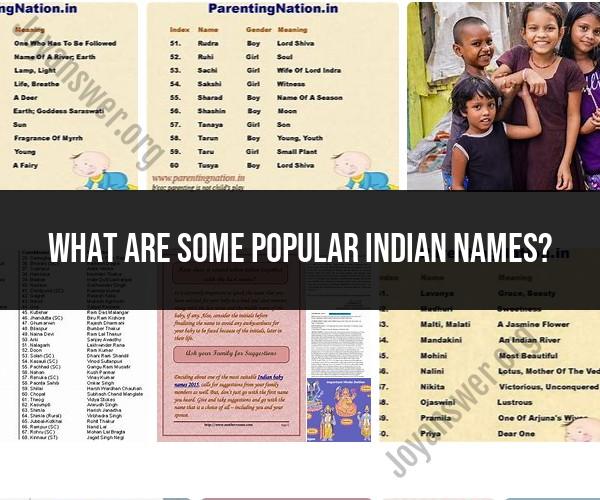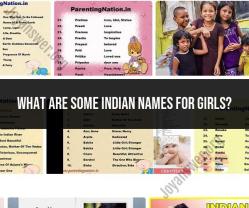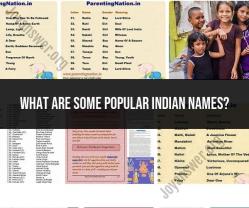What are some popular Indian names?
India is a diverse country with a rich cultural heritage and a wide range of languages and traditions. As a result, Indian names are incredibly diverse and meaningful, often reflecting aspects of the country's history, religion, and culture. Here are some popular Indian names from different regions and linguistic backgrounds, along with their meanings:
Note: Indian names often have multiple variations and transliterations due to the variety of languages and scripts used across the country.
Aarav (आरव): This Sanskrit name means "peaceful" or "calm." It has become increasingly popular in recent years.
Aisha (आइशा): A common name in India, Aisha means "alive" or "living" and has Islamic origins.
Arya (आर्य): Meaning "noble" or "honorable" in Sanskrit, Arya is a popular unisex name in India.
Riya (रिया): Riya is a name of Sanskrit origin, meaning "singer" or "vocalist."
Arun (अरुण): This name means "red" or "dawn" in Sanskrit, and it's popular in many parts of India.
Akshay (अक्षय): Meaning "indestructible" or "immortal" in Sanskrit, Akshay is a common name in India.
Sneha (स्नेहा): A name of Sanskrit origin, Sneha means "affection" or "love."
Kabir (कबीर): This name has Islamic and Sikh origins and means "great" or "powerful."
Meera (मीरा): Meera is a popular name in India, often associated with the historical poet-saint Meera Bai. It means "prosperous."
Zara (ज़ारा): A name with Arabic origins, Zara means "blooming flower" or "radiance."
Aditi (अदिति): In Sanskrit, Aditi means "limitless" or "unbound." It's also the name of a Hindu goddess.
Krishna (कृष्ण): A popular name, especially among Hindus, Krishna is the name of the beloved god in Hinduism known for his playful and divine nature.
Sanjana (संजना): Sanjana means "gentle" or "soft" in Sanskrit and is a common name for girls.
Rahul (राहुल): A widely used name, Rahul means "conqueror of all miseries" in Sanskrit.
Ishaan (ईशान): Ishaan means "sun" or "northeast" and is a popular name in various regions of India.
Vidya (विद्या): Vidya is a Sanskrit name that means "knowledge" or "wisdom."
Neha (नेहा): A popular name for girls, Neha means "affection" or "love."
These are just a few examples, and there are countless more Indian names with unique meanings and cultural significance. Indian names often hold deep cultural and religious significance, making them a reflection of the country's rich heritage.
1. The Founders and Pioneers of Positivist Criminology
Positivist criminology is a school of thought that emerged in the late 19th century. It is based on the idea that crime is a product of biological, psychological, and social factors. The founders and pioneers of positivist criminology include:
- Cesare Lombroso: Lombroso was an Italian physician who is considered the father of positivist criminology. He believed that criminals were born with physical and mental characteristics that made them more likely to commit crime.
- Enrico Ferri: Ferri was an Italian jurist and criminologist who was a student of Lombroso. He believed that crime was caused by a combination of biological, psychological, and social factors.
- Raffaele Garofalo: Garofalo was an Italian lawyer and criminologist who was also a student of Lombroso. He believed that crime was a product of natural selection and that criminals were atavistic, meaning that they had inherited traits from primitive ancestors.
2. Cesare Lombroso and the Birth of Positivist Criminological Theory
Lombroso's work on positivism was highly influential in the late 19th century. He published a number of books on the topic, including Criminal Man in 1876 and Female Criminality in 1893. In his work, Lombroso argued that criminals could be identified by their physical features, such as a large jaw, a receding forehead, and a long nose. He also believed that criminals had certain personality traits, such as impulsiveness, cruelty, and a lack of remorse.
Lombroso's work was controversial, but it helped to lay the foundation for the field of scientific criminology. His ideas about the biological causes of crime have since been discredited, but his work helped to shift the focus of criminology away from moralistic explanations of crime and towards more scientific explanations.
3. Contributions of Other Notable Criminologists to Positivism
In addition to Lombroso, Ferri, and Garofalo, there were a number of other criminologists who made significant contributions to positivism. These include:
- Emile Durkheim: Durkheim was a French sociologist who is credited with developing the theory of anomie. Anomie is a state of social disorganization that can lead to crime and other forms of deviance.
- Edwin Sutherland: Sutherland was an American criminologist who developed the theory of differential association. This theory argues that crime is learned through interaction with others who are already involved in crime.
- Robert Merton: Merton was an American sociologist who developed the theory of strain theory. Strain theory argues that crime is caused by the gap between people's aspirations and their ability to achieve those aspirations.
4. The Evolution of Positivist Thought in Criminology
Positivist criminology has evolved over time. Early positivists believed that crime was primarily caused by biological factors. However, later positivists began to emphasize the role of social and environmental factors in crime.
Today, positivist criminologists use a variety of research methods to study crime, including surveys, interviews, and statistical analysis. They are interested in identifying the factors that contribute to crime and in developing effective crime prevention and rehabilitation programs.
5. Contemporary Scholars in the Field of Positivist Criminology
Some of the leading contemporary scholars in the field of positivist criminology include:
- John Gottfredson and Michael Hirschi: Gottfredson and Hirschi developed the general theory of crime, which is one of the most widely accepted theories of crime in the world.
- David Farrington: Farrington is a British criminologist who has conducted extensive research on the development of crime.
- Terrie Moffitt: Moffitt is an American criminologist who is known for her research on life-course-persistent and adolescence-limited offenders.
Positivist criminology continues to be a major school of thought in criminology today. Positivist criminologists are at the forefront of research on crime and its causes. Their work is helping to develop more effective ways to prevent and reduce crime.









